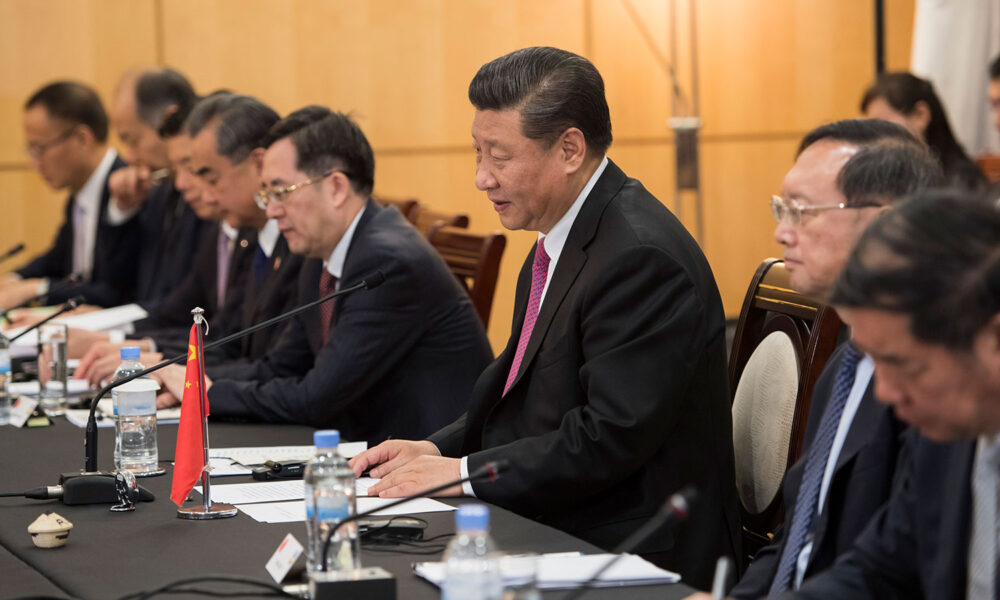I was deeply disappointed by Mitt Romney’s recent op-ed on China. I’ve always thought of him as an intelligent and honorable person. Perhaps that’s because the Mormon missionaries I met running educational programs in China were conscientious and respectful students of China’s language and culture, always open to understanding the Chinese point of view.
So, I was shocked to see Senator Romney revive racist rhetoric from the late 19th century comparing the Chinese to a disease to be cured with disinfectant. His invocation of President James Garfield called to mind the virulent anti-Chinese racism of the period, which led to mob murders of Chinese immigrants and the Chinese Exclusion Act: an odious law that sanctioned a half-century of racial discrimination against Chinese immigrants and Chinese Americans.
Romney’s op-ed aims to justify a new wave of anti-Chinese legislation making its way through Congress. The Democratic leadership in both chambers appears to be eager to use antipathy towards China to get a bipartisan win for President Biden, who wants Congress to approve hundreds of billions of dollars in new spending on the country’s scientific and technological infrastructure.
Biden is using the perceived need to compete with China to keep Democrats in line and overcome Republican opposition. But in the process, he is allowing anti-Chinese ideologues to insert irrational and self-destructive provisions into legislation intended to reinvest in US science and technology. If those provisions are not stripped out of the final bill, they will lead to the racial profiling of Chinese Americans at home and the disintegration of US alliances abroad.
One of the most troubling provisions is the appointment of what they might as well call an Undersecretary of Sinophobia in every department of the federal government. These new Cold War commissars are mandated to seek out and destroy nefarious Chinese influence in every nook and cranny of American life.
Any act of engagement with any Chinese individual could be subject to federal scrutiny. The Secret Service could start policing China-related educational programs in US colleges and universities. This provision is designed to disrupt normal economic, social and cultural interactions between ordinary Chinese and Americans. And it will inevitably increase the already troublesome racial profiling of Chinese Americans.
Another provision creates a 1.2 billion dollar “Countering Chinese Influence Fund” to carry out the same kind of aggressive anti-Chinese policing abroad. It creates a global network of coordinators and assistants within the Department of State whose job is to investigate and intimidate governments, businesses, civic groups, educational institutions and individuals in foreign countries that have economic, social, cultural or family ties to China.
It is hard to imagine how this ham-handed “us or them” approach will strengthen US alliances. But it is easy to see how it will weaken them. Political and economic leaders throughout Asia are begging the United States not to force them to choose. They want the United States to promote comity and economic development, not division and economic disruption.
China’s communist government presents real challenges for the United States and the rest of the world. It is using its steadily increasing military capabilities to press its neighbors to settle long-standing territorial disputes. Chinese economic policies impact the welfare of other nations and the sustainability of the natural environment.
But Romney and the ideologues behind this new wave of anti-China legislation clearly don’t understand these problems. In his op-ed Romney claims Chinese military spending proves it “devotes a significant share of its financial spoils to its hegemonic agenda.” The data tells a different story.
China has spent a constant and comparatively low two percent of GDP on its military since 1990. Chinese military spending as a percentage of government expenditures has been declining for more than thirty years. China was able to close the military gap with the United States in East Asia because it prioritized economic growth.
The Chinese communist government’s unresolved territorial claims have not changed since the first maps of the People’s Republic of China were published in the early 1950s. It is those very specific claims, not some amorphous and imaginary global agenda, that US policy needs to address.
Romney’s anti-China crusade is also animated by a fundamental misperception of China’s economy. He sees China’s large population as an asset when it is actually China’s greatest liability. On a per capita basis, China ranks 73rd among all nations in income and 72nd in production. Chinese leaders oversee what the World Bank describes as an upper-middle income economy that remains well behind the high-income economies of United States and other developed nations. Six-hundred million of China’s 1.4 billion people – roughly four in 10 Chinese – earn less than 150 US dollars per month, and that’s after four decades of double-digit economic growth. The problematic Chinese economic policies Romney rightly complains about are the product of the domestic political pressures of comparative poverty, not the global ambitions of a nouveau riche economic powerhouse anxious to take down the United States.
China’s communist leaders do seem to believe the United States is declining. They think US political and economic elites are vain, incompetent, and corrupt. And they are making the case that the world cannot depend on the United States to solve its most pressing problems. Since the financial crisis of 2008, Chinese leaders have been doing everything they can to make China less dependent on the United States and encouraging other countries to help them create a less US-centric global system. From their point of view, that’s not a quest for hegemony, just common sense.
Biden is right when he argues the best way to respond is to reinvest in the United States. But he’s wrong to empower a paranoid impulse focused more on knocking Chinese down than lifting Americans up. That’s how losers compete. China, and the rest of the world, will take notice.

